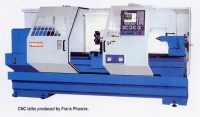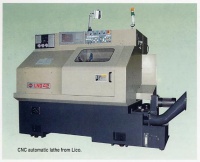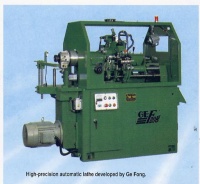Taiwan Turning Quickly And Headed for the Top
Mar 17, 2005 Ι Industry News Ι Machinery & Machine Tools Ι By Ben, CENS
Players in Taiwan's lathe-making sector have enjoyed substantial production and export growth in recent years as global demand has shown renewed signs of life. This resurgence will be nowhere more apparent than at the upcoming biennial Taipei International Machine Tool Show (TIMTOS), which kicks off its six-day run on March 15, 2005, at the Taipei World Trade Center.
Over the past two years several Taiwan lathe producers have been developing sophisticated models with multiple processing functions. Among them are computerized numerically controlled (CNC) units that are virtual Cuisinarts of the shop floor, cutting, milling, and grinding even if dicing and pureeing escape their formidable skills. What's more, the new models can complete this dizzying array of processes in a single cycle, making short work of complex jobs.
These new machines are entering the market as barriers to overseas markets fall before the flattening force of the World Trade Organization (WTO). Taiwanese produces are hopeful that their combination of product functionality, low pricing and flexible production will serve them well on the leveled field.
Indeed, the local industry has already chalked up impressive market gains. The sugar-rush that is mainland China's economy has showered machine producers in Taiwan with business opportunities. And as bureaucrats there nudge the coastal prosperity west, the future continues to look better for suppliers of heavy-cutting machine tools, including automatic lathes.
Beyond China, the picture looks almost as promising. Most lathe producers in Taiwan expect non-China sales this year to top last year's performance, with high-precision and high-speed lathes for high-tech applications leading the charge.
The Taiwan Machine Tools Foundation (TMTF) figures that Taiwan exported US$359.21 million worth of lathes in the first 11 months of 2004, up 44% from the US$249.09 million registered in the corresponding period of the year before.
The top 10 export outlets for domestically made lathes in that period were, in descending order, Hong Kong/mainland China, the U.S., Turkey, Thailand, Malaysia, Netherlands, South Korea, Italy, India, and Germany.
Working Metal
One niche that has recently attracted the attention of Taiwan lathe producers is the metalworking sector, and few have been quicker to capitalize on this potential than Frank Phoenix International Corp.
Frank Phoenix was founded in 1990 as a manufacturer and exporter of conventional machine tools, such as mold-making lathes, grinding machines, machining centers and milling machines, and their related accessories. Five years later, it teamed up with several partners to expand into the manufacture and sales of more sophisticated CNC milling machines and CNC lathes fitted with locally made and imported industrial-class controllers.
In 1997, Frank Phoenix teamed up with the Mechanical Industry Research Laboratories (MIRL) under the semi-official Industrial Technology Research Institute (ITRI) in Taiwan, to jointly develop a series of advanced IPC-based CNC controllers.
The company continued its expansion with the 1999 acquisition of Topfit Machinery Co., a CNC milling machine, CNC lathe, and machining-center specialist. In the same year, Frank Phoenix debuted an upgraded series of CNC milling machines, the FM-205/255/300 CNC/MH/ATC. According to company chief executive Frank Lin, the series features higher precision specifications, a wider application range, and greater durability than the company's previous models.
About five years ago, the company developed a direct-coupling transmission-milling device to accelerate the feeding speed of its CNC milling machines, poising the company to reach higher in the competitive marketplace.
Frank Phoenix is also developing a new bed-type CNC milling machine outfitted with Windows NT-based high-speed, high-precision CNC controllers.
Another new item from Frank Phoenix is a gantry-type mini CNC milling machine, which the company claims is its most economical, high-performance, space-saving unit available for metal and non-metal milling and engraving work.
Recently the company introduced a new model of flat-bed CNC lathe, which will be displayed at TIMTOS 2005.
Moving On Up
Also moving rapidly up the lathe-industry food chain is Lico Machinery Co., Ltd., a 25-year-veteran maker of automatic lathes exported to over 25 nations worldwide.
Over the past several years, the company has installed an array of advanced testing and inspection equipment to lift quality, including two state-of-the-art coordinator machines.
Company manager Ray Cheng says that Lico's R&D department is constantly improving the company's product line and introducing new manufacturing techniques. Such efforts helped the ISO-9002-certified company come away with the "National Product of Excellence Award" presented by the Ministry of Economic Affairs (MOEA).
Lico can turn out 30 lathes per month under normal operations, but can ramp up production to 50 lathes per month to meet rush orders. Most of the company's products are exported, with major outlets including Southeast Asia, Northeast Asia, mainland China, Latin America, North America, and Europe.
One of the company's latest models is its LND A-series CNC automatic lathe, which has a 12-station power turret and tailstock. The machine can handle complex turning jobs in one cycle.
The unit is designed to meet the ever-changing demand of the metalworking industry. It is suitable for the production of plumbing parts, information technology products, optical instruments, automobile components, and sophisticated aviation parts.
Cam-Operated Lathes
Ge Fong Machinery Co., Ltd., established in 1979, is one of Taiwan's leading producers of cam-operated automatic lathes (fixed and sliding head) and sliding-head CNC lathes.
In 2003, Ge Fong honed its price-performance edge in the market by fitting its machines with low-cost personal computer (PC)-based controllers from Pou Yuen Technology Co., an automation-specialist subsidiary of Taiwan's Pou Chen Group.
Company president Wang Tsung says that in addition to its own R&D team, Ge Fong has cooperated with a leading local academic institution for years to develop and access advanced manufacturing technologies.
Ge Fong has also implemented one of the industry's most stringent quality-control systems, enabling it to closely monitor every step in the production process. The company was CE certified in 1996, and it earned its ISO-9000:2000 certification in 2001.
Wang says her company is dedicated to developing machines to help customers reduce production costs and increase productivity through automation.
Over the past three years, Ge Fong has grown at a double-digit pace. Most of its output is destined for mainland China, Southeast Asia, and some industrialized nations. The company welcomes cooperation with customers in developing new products.
Spot On
For nearly two decades, First Chant Enterprise Co., Ltd., has been a leading name in Taiwan's precision lathe industry, first as a distributor and more recently as a producer.
In 1997, the company began making CNC lathes at a 1, 000-square-meter production facility in Taichung county, central Taiwan. It has also opened several maintenance branches in mainland China and set up distribution channels in other markets to support it overseas sales.
Company president Alex Tang says that First Chant has been developing state-of-the-art CNC lathes to lure customers from around the globe. He concedes that his company is still a small player in the domestic machine-tool industry, but what it lacks in size it makes up in flexibility, especially in design capability.
With a work force of 35, First Chant can roll out 12 CNC lathes per month at unit prices ranging from US$40, 000 to US$60, 000. Its machines are designed for use in high-tech industries where precision is paramount, as in the optoelectronic, electronic, medical equipment sectors.
To assure the high quality of its products, First Chant uses precision mechanical components and parts on its CNC lathes.
First Chant sells its lathes under the "Aegis" and "Aural" brands, mainly to China, Southeast Asia and the domestic market.
Thanks to booming global demand, the company has enjoyed double-digit annual sales growth in the past three years. Tang expects this heady pace to slow this year due to an expected cooling of the global machine-tool market.
The company will take part in TIMTOS 2005 as well as several machinery shows in mainland China this year
Over the past two years several Taiwan lathe producers have been developing sophisticated models with multiple processing functions. Among them are computerized numerically controlled (CNC) units that are virtual Cuisinarts of the shop floor, cutting, milling, and grinding even if dicing and pureeing escape their formidable skills. What's more, the new models can complete this dizzying array of processes in a single cycle, making short work of complex jobs.
These new machines are entering the market as barriers to overseas markets fall before the flattening force of the World Trade Organization (WTO). Taiwanese produces are hopeful that their combination of product functionality, low pricing and flexible production will serve them well on the leveled field.
Indeed, the local industry has already chalked up impressive market gains. The sugar-rush that is mainland China's economy has showered machine producers in Taiwan with business opportunities. And as bureaucrats there nudge the coastal prosperity west, the future continues to look better for suppliers of heavy-cutting machine tools, including automatic lathes.
Beyond China, the picture looks almost as promising. Most lathe producers in Taiwan expect non-China sales this year to top last year's performance, with high-precision and high-speed lathes for high-tech applications leading the charge.
The Taiwan Machine Tools Foundation (TMTF) figures that Taiwan exported US$359.21 million worth of lathes in the first 11 months of 2004, up 44% from the US$249.09 million registered in the corresponding period of the year before.
The top 10 export outlets for domestically made lathes in that period were, in descending order, Hong Kong/mainland China, the U.S., Turkey, Thailand, Malaysia, Netherlands, South Korea, Italy, India, and Germany.
Working Metal
One niche that has recently attracted the attention of Taiwan lathe producers is the metalworking sector, and few have been quicker to capitalize on this potential than Frank Phoenix International Corp.
Frank Phoenix was founded in 1990 as a manufacturer and exporter of conventional machine tools, such as mold-making lathes, grinding machines, machining centers and milling machines, and their related accessories. Five years later, it teamed up with several partners to expand into the manufacture and sales of more sophisticated CNC milling machines and CNC lathes fitted with locally made and imported industrial-class controllers.
In 1997, Frank Phoenix teamed up with the Mechanical Industry Research Laboratories (MIRL) under the semi-official Industrial Technology Research Institute (ITRI) in Taiwan, to jointly develop a series of advanced IPC-based CNC controllers.
The company continued its expansion with the 1999 acquisition of Topfit Machinery Co., a CNC milling machine, CNC lathe, and machining-center specialist. In the same year, Frank Phoenix debuted an upgraded series of CNC milling machines, the FM-205/255/300 CNC/MH/ATC. According to company chief executive Frank Lin, the series features higher precision specifications, a wider application range, and greater durability than the company's previous models.
About five years ago, the company developed a direct-coupling transmission-milling device to accelerate the feeding speed of its CNC milling machines, poising the company to reach higher in the competitive marketplace.
Frank Phoenix is also developing a new bed-type CNC milling machine outfitted with Windows NT-based high-speed, high-precision CNC controllers.
Another new item from Frank Phoenix is a gantry-type mini CNC milling machine, which the company claims is its most economical, high-performance, space-saving unit available for metal and non-metal milling and engraving work.
Recently the company introduced a new model of flat-bed CNC lathe, which will be displayed at TIMTOS 2005.
Moving On Up
Also moving rapidly up the lathe-industry food chain is Lico Machinery Co., Ltd., a 25-year-veteran maker of automatic lathes exported to over 25 nations worldwide.
Over the past several years, the company has installed an array of advanced testing and inspection equipment to lift quality, including two state-of-the-art coordinator machines.
Company manager Ray Cheng says that Lico's R&D department is constantly improving the company's product line and introducing new manufacturing techniques. Such efforts helped the ISO-9002-certified company come away with the "National Product of Excellence Award" presented by the Ministry of Economic Affairs (MOEA).
Lico can turn out 30 lathes per month under normal operations, but can ramp up production to 50 lathes per month to meet rush orders. Most of the company's products are exported, with major outlets including Southeast Asia, Northeast Asia, mainland China, Latin America, North America, and Europe.
One of the company's latest models is its LND A-series CNC automatic lathe, which has a 12-station power turret and tailstock. The machine can handle complex turning jobs in one cycle.
The unit is designed to meet the ever-changing demand of the metalworking industry. It is suitable for the production of plumbing parts, information technology products, optical instruments, automobile components, and sophisticated aviation parts.
Cam-Operated Lathes
Ge Fong Machinery Co., Ltd., established in 1979, is one of Taiwan's leading producers of cam-operated automatic lathes (fixed and sliding head) and sliding-head CNC lathes.
In 2003, Ge Fong honed its price-performance edge in the market by fitting its machines with low-cost personal computer (PC)-based controllers from Pou Yuen Technology Co., an automation-specialist subsidiary of Taiwan's Pou Chen Group.
Company president Wang Tsung says that in addition to its own R&D team, Ge Fong has cooperated with a leading local academic institution for years to develop and access advanced manufacturing technologies.
Ge Fong has also implemented one of the industry's most stringent quality-control systems, enabling it to closely monitor every step in the production process. The company was CE certified in 1996, and it earned its ISO-9000:2000 certification in 2001.
Wang says her company is dedicated to developing machines to help customers reduce production costs and increase productivity through automation.
Over the past three years, Ge Fong has grown at a double-digit pace. Most of its output is destined for mainland China, Southeast Asia, and some industrialized nations. The company welcomes cooperation with customers in developing new products.
Spot On
For nearly two decades, First Chant Enterprise Co., Ltd., has been a leading name in Taiwan's precision lathe industry, first as a distributor and more recently as a producer.
In 1997, the company began making CNC lathes at a 1, 000-square-meter production facility in Taichung county, central Taiwan. It has also opened several maintenance branches in mainland China and set up distribution channels in other markets to support it overseas sales.
Company president Alex Tang says that First Chant has been developing state-of-the-art CNC lathes to lure customers from around the globe. He concedes that his company is still a small player in the domestic machine-tool industry, but what it lacks in size it makes up in flexibility, especially in design capability.
With a work force of 35, First Chant can roll out 12 CNC lathes per month at unit prices ranging from US$40, 000 to US$60, 000. Its machines are designed for use in high-tech industries where precision is paramount, as in the optoelectronic, electronic, medical equipment sectors.
To assure the high quality of its products, First Chant uses precision mechanical components and parts on its CNC lathes.
First Chant sells its lathes under the "Aegis" and "Aural" brands, mainly to China, Southeast Asia and the domestic market.
Thanks to booming global demand, the company has enjoyed double-digit annual sales growth in the past three years. Tang expects this heady pace to slow this year due to an expected cooling of the global machine-tool market.
The company will take part in TIMTOS 2005 as well as several machinery shows in mainland China this year
©1995-2006 Copyright China Economic News Service All Rights Reserved.








